Mindfulness retreats: The quiet travel solution to a noisy world
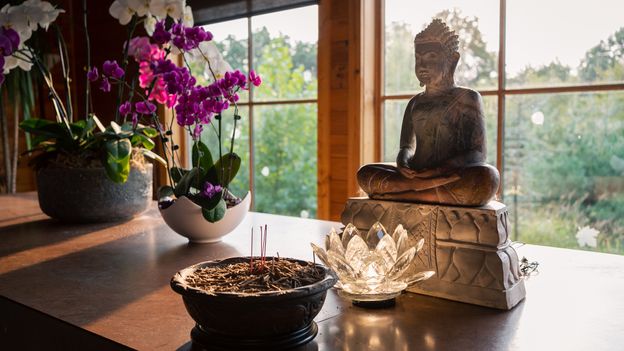
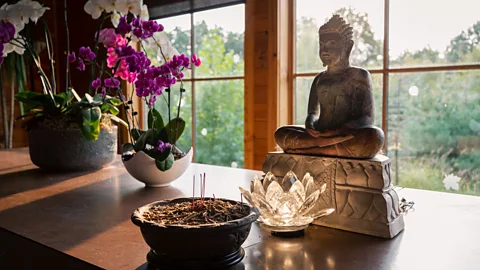 Kate Schoenbach
Kate SchoenbachIn a world simultaneously connected through and plagued by social media, silence is becoming an ever-appreciating commodity.
The monk’s gentle voice ebbed as he rang a large bronze bell, the first of three “dings” signalling us to settle onto our cushions. I took one last glance at the September sunrise spilling onto the magenta orchids of the Buddha altar, bringing dimension to the otherwise dimly lit room. The interplay of fragrant incense weaving through the sun’s golden rays created an ambiance of complete serenity in the Great Togetherness Meditation Hall. A calligraphy banner above the altar read, “This Is It” – reminding me that the present moment is all we have.
Now, surrounded by dozens of monks, nuns and fellow retreat-goers, I – finally – felt at ease, as if I was truly home. At the sound of the third “ding”, I closed my eyes, took a deep breath and settled into my cushion.
Mindfulness retreats, which span everything from Buddhist meditation retreats like the one I was on to beachside yoga retreats, are becoming increasingly popular as people seek to disconnect. “We’re now seeing more people wanting to host retreats – they’re becoming more mainstream,” explained Sofiah Thom, owner of Danyasa Eco-Retreat in Dominical, Costa Rica.
Disconnecting from the outside world to prioritise her health is exactly why Shannon Lutz, a New York business professional, attends mindfulness retreats. Having attended retreats at both Blue Cliff and Danyasa, Lutz enjoys the “silence and calming benefits” these retreats instill by encouraging attendees to shut off their phones.
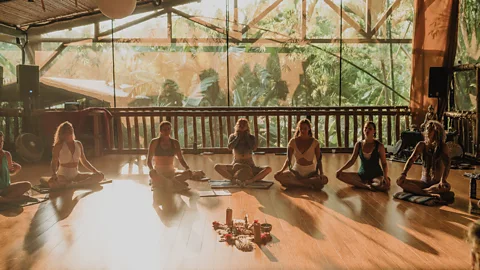 Alizé Jireh Yaccino
Alizé Jireh YaccinoWhen I spoke to Blue Cliff Abbess Sister True Vow, she told me that feedback from retreat attendees unsurprisingly highlights social media as a major distraction. “The number one answer to ‘what is pulling you away from your daily life and one another?’ is ‘social media and smartphones’.”
Today, there are an estimated five billion social media users globally, with the average person spending more than 2.5 hours on social media each day. A recent report from UC Davis explains that while social media can make us feel connected, it also has a “dark side“, fuelling anxiety, depression and loneliness. In fact, the US Surgeon General issued an opinion in June calling for a warning label on social media platforms for adolescents. However, as Dr Edward Brodkin, associate professor of psychiatry and a neuroscientist at the University of Pennsylvania, points out, “social media is impacting us all. It draws us into a virtual world of screens and away from direct interaction with others.”
As a traveller who has always lived in bustling cities – New York, London, Montreal – the cacophony of urban life, smartphone notifications and social media makes it easy for me to lose focus. This was my fifth Blue Cliff retreat since 2016, and each time I am refreshed by the silence and reflective discussion that help me relax and become mindful of the present moment. Here, 14-hour daily silent periods are followed by small group talks where monastics offer retreat-goers techniques to stay present. Simple gathas like “breathing in, there is only this present moment; breathing out, it is a wonderful moment” help focus attention both on and off the cushion.
The aim of mindfulness retreats is to provide the space to cultivate habits that help us become more present. They range in form and may focus on meditation, yoga, spiritual reflection or general health and wellness. What they all have in common is that they typically incorporate periods of silence, healthy eating, mentorship, breathwork and nature, and have become increasingly popular as people adopt healthier lifestyles.
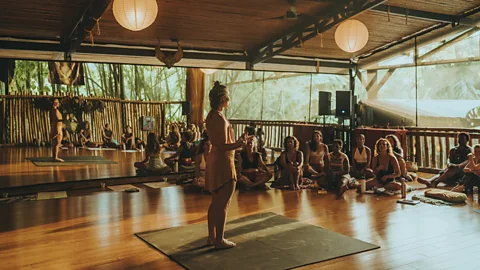 Alizé Jireh Yaccino
Alizé Jireh YaccinoAccording to research firm Allied Market Research, the global wellness retreat market (which includes mindfulness retreats) is set to double by 2032, reaching $364bn, with demand driven by increased stress, a growing consciousness surrounding wellness and a “desire for digital detoxification”. Silent travel was specifically named as one of Condé Nast Traveler’s top trends for 2024, noting its “promising implications for wellbeing”.
Thom, who has been hosting retreats in Costa Rica since 2008, says her clientele has expanded since the pandemic as people are now prioritising their health and well-being. “People don’t just want to sit on the beach with a margarita anymore, they want to be in a beautiful setting and learn tools to help them in everyday life.”
Meditation, which cultivates mindfulness, benefits us emotionally and physically. The Mayo Clinic notes that meditation can help lower stress levels, reduce negative feelings, enhance creativity and increase patience (a definite necessity for me). Brodkin explains that “meditation helps us regulate stress hormones. It develops certain circuits in the frontal-lobe of our brains that help us to be more aware of, and regulate, our thoughts and emotions.”
Brodkin’s book Missing Each Other – How to Cultivate Meaningful Connections, which he wrote with psychologist Ashley Pallathra, discusses ways to cultivate mindful awareness when engaging with others – particularly important in an age of digital connection. “There is something addicting about social media and the internet, and mindfulness practices get us away from screens.”
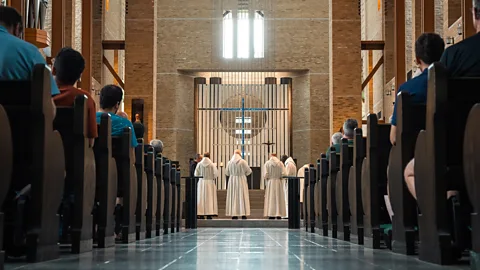 Kate Schoenbach
Kate SchoenbachDuring the last day of my September Blue Cliff retreat – phone still switched off – I followed monks and fellow retreat-goers on a post-lunch walking meditation in the lush forest. The silence allowed me to observe my surroundings more mindfully and drink in nature’s synchronistic beauty. The constant chatter in my mind subsided, replaced by waves of serenity as I eyed the sun’s rays glistening on the rippling pond. The group had cultivated a profound sense of calm that resonated with the surrounding nature – and soon a fawn felt comfortable enough to approach us.
Like Lutz, I appreciate silence in cultivating mindfulness and have attended other retreats that emphasise it. One such place is Abbaye de Saint-Benoît-du-Lac, a Benedictine Abbey across the Vermont border in Quebec. Typically known for their savoury home-crafted cheeses and cider, the Abbey also hosts retreats for quiet contemplation. Intrigued by their Gregorian chant masses, I recently attended a weekend retreat and found it provided an ideal space to unplug, de-stress and cultivate mindfulness.
Father Garand, an Abbey monk, explained that retreats are helpful because they get us out of our routines. At the Abbey, “there’s a physiological atmosphere of serenity, and people connect with that”, he said. I felt this connection during Latin mass, where live Gregorian chant and fragrant incense created a soothing atmosphere, much like the serenity I experience in Blue Cliff’s meditation hall.
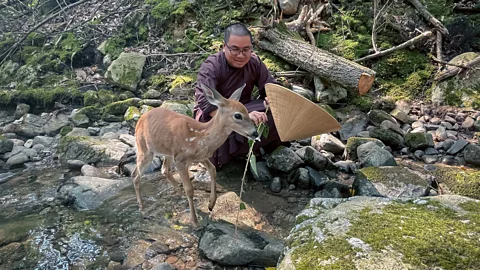 Kate Schoenbach
Kate SchoenbachIn a world simultaneously connected through and plagued by social media, silence is becoming an ever-appreciating commodity. While retreats – spiritual or otherwise – provide an opportunity to unwind and develop helpful habits, the question is, how to bring these calming practices home? Sister True Vow advises keeping the commitment “clear and simple” and finding a supportive community. While I try to practice a short meditation each day, the serenity reboot at places like Blue Cliff and Abbaye de Saint-Benoît-du-Lac keeps me returning for weekend retreats at least once a year.
As we emerged from the Blue Cliff woods post-walking meditation, we passed a calligraphy sign at the entrance of the monastery that read, “I have arrived, I am home”, reminding me once again of Thay’s teaching that our home – our sense of serenity – is in the present moment.
BBC Travel’s Well World is a global take on wellness that explores different ways that cultures the world over strive for a healthy lifestyle.
—
Related
Turkish Airlines and Qatar Airways Suspend Mogadishu Flights Following US…
Home » Airlines News of Qatar » Turkish Airlines and Qatar Airways Suspend Mogadishu Flights Following US Embassy Terror Alert, Raising Security Concerns at
Local tourism destinations grow fast
Men sit at the Doha Corniche backdropped by high buildings in Doha on March 3, 2025. Photo by KARIM JAAFAR / AFP DOHA: Local tourism destinations are g
Hajj, Umrah service: Qatar Airways introduces off-airport check-in for pilgrims
Image credit: Supplied Qatar Airways has introduced an off-airport check-in
IAG, Qatar Airways, Riyadh Air, Turkish Airlines, Lufthansa & more…
Turkish Airlines – a Corporate Partner of the FTE Digital, Innovation & Startup Hub – is charting a course to rank among the top 3 global airlines for













